The University of Wisconsin–Madison has a relationship with China that spans more than 100 years. Currently, more than 3,000 Chinese students attend UW–Madison, cementing the long-lasting connection the two institutions have built.
Throughout the decades, Chinese alumni have built strong academic, professional, and personal foundations in Madison, which have helped them launch successful careers, with many assuming leadership roles in government, science, technology, finance, business, art, and higher education. Alumni serve as faculty at top Chinese academic institutions and our own faculty collaborate on key topics that have the potential to have a critical impact on China, such as air quality, wildlife conservation, and traffic improvement. See some of the highlights from our history below.
1907: Chinese names first appear on University of Wisconsin enrollment lists when Yu-fong Louis Sun of Suzhou, his cousin Jeefong Roy Sun of Shanghai, and Juedan Tung-Shou Chen all enrolled in the College of Engineering.
1909: Yun Yiu Wong becomes the first female Chinese student to register at the University of Wisconsin. She enrolled for the summer session to gain a better knowledge of English before starting a regular university program.
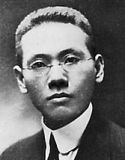
1910: First UW degrees awarded to Chinese students. Guok-Tsai Chao, Yet C. Owyang, and Chu-Tung Tsai all received bachelor degrees from the College of Letters and Science. Mr. Chao went on to because vice president of Tsinghua University in Beijing, while Mr. Owyang became managing director of the Kwangtung Provincial Bank in Canton and Mr. Tsai served as an assistant to the Republic of China’s first premier. Also in 1910 the UW awarded master’s degrees to four students from China (and two from Japan), including an education degree to Ye-Tsung Tsur, who returned to Beijing to transform Tsinghua from a prep school to a comprehensive university (Mr. Chao served as vice president during Mr. Zhou’s tenure as president of Tsinghua University). The fall of 1910 is also when the first Boxer Indemnity scholarship students began to enroll at UW. Three in the first cohort of Boxer Indemnity students were assigned to UW, and at least one later transferred into UW.
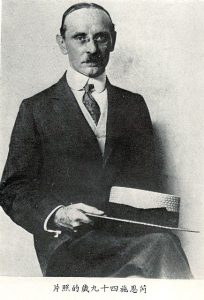
1913: UW political science professor Paul Samuel Reinsch named by President Woodrow Wilson to become the first American minister to post-imperial China. Reinsch served in that capacity through 1919 and recommended a number of students to UW. A letter dated January 20, 1908, recommended Chu-Tung Tsai for admittance, noting that “Mr. Tsai has worked for me for some time and I know that he is able to profit by the courses in the university.” Political Science’s departmental history also notes the influence of Prof. Reinsch, who sparked “a striking flow of doctoral students to the department in the interwar years. Between 1929 and 1936, seven of the 28 doctorates awarded went to Chinese scholars.
1917: The UW library begins its collection of Chinese materials by accepting a donation of books and journals from a Chinese student.
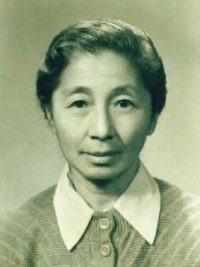
1924: First UW degree awarded to a female Chinese student when Tso-Yung Chu received a degree in bacteriology from the College of Agriculture. The next year, two more Chinese women received degrees—Anna Chang in French, and Hwei-Lan Chang in physical education. Ms. Chang became a pioneer in China in the field of physical education for women.
As pictured on the right, Zhang Huilan, UW Class of 1926, was considered the “Mother of Women’s Physical Education in China.” She was also among the first group of women to attend the UW–Madison.
1929: The Boxer Indemnity Scholarship Program concludes. Of the 1,289 Boxer Indemnity Scholars sent to 128 universities across the U.S. from 1909–29, 95 students came to UW–Madison, the largest cohort at a public university, and fourth overall behind Columbia, Harvard, and MIT.
1950: Chinese language instruction is formally included in the university curriculum.
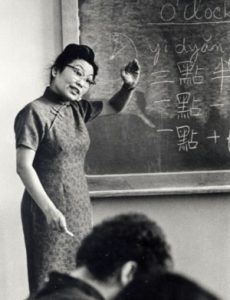
1962: A Department of Chinese created in the fall. This later became part of what is known today as the Department of Asian Languages and Cultures. The Center for East Asian Studies opened in the same year, one of eight federally-funded National Resource Centers on campus.
As shown on the left, Prof. Kuo-P’ing Chou helped create the Department of Chinese and served as its first chair.
1965: The university hires its first Chinese Studies librarian, Chester Wang.
1974: Professor of plant pathology Arthur Kellman was among the first UW–Madison faculty members to visit China in the era of Sino-U.S. rapprochement. Dr. Kellman traveled with a group of scientists to study China’s agriculture systems. Horticulturalist Warren Gabelman and political scientist Edward Friedman also conducted research in 1970s China.
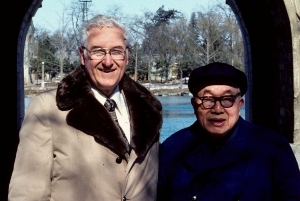
1979: UW–Madison Chancellor Irving Shain leads an official delegation to China in February, touring universities and institutions in Beijing, Nanjing, Shanghai and Changsha. The delegation worked to identify students and scholars to bring to UW–Madison. The first group of 55 visiting scholars from China arrived on campus for the fall semester. Shain made a second visit to China in November 1979 to interview more candidates. From 1979–1984, over 450 “Shain Scholars” came to the UW–Madison from across China through this program.
Pictured on the right is Chancellor Irving Shain at Peking University in 1979 with UW–Madison chemistry Class of 1924 alum, Huang Ziqing.
1980: The First International Conference on the “Dream of the Red Chamber” (one of China’s Four Great Classical Novels) held at UW–Madison, June 16–20, bringing together 88 scholars from the U.S., Canada, Europe and Asia.
1990: East Asian Legal Studies Center forms in the UW–Madison Law School.
2004: The summer UW Tianjin intensive Chinese language program at Nankai University is launched. This faculty-led study abroad program offers a year of Chinese language instruction condensed into a summer.
2007: Wisconsin China Initiative forms in the Division of International Studies to bring together faculty, alumni and leaders in business and government.
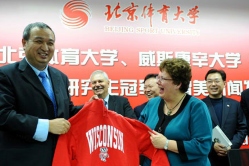
2010: Chancellor Biddy Martin highlights her emphasis on China by leading two trips there in one calendar year. Her spring visit focused on Beijing, Tianjin and Shanghai, while the fall trip included stops in Hong Kong and Taipei, Taiwan.
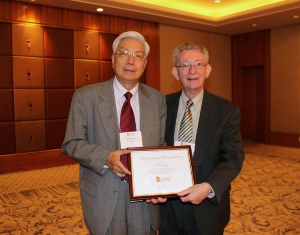
2012: Interim Chancellor David Ward leads a delegation to China that is highlighted by the opening of a UW office in Shanghai. During its three years of operation, the Shanghai Innovation Office facilitated two major symposiums (“Translation of Medical and Bio-Technologies from Academic to the Market” in 2012, and “Sustainable Urban Environments” in 2014); a series of academic seminars on language learning, chemical anthropology, voice medicine, environmental studies, and intellectual history; and professional training workshops for Shanghai-based employees of a Midwestern company. The office also hosted several high-level delegations, including a visit by Governor of Wisconsin. Operations were overseen by a faculty lead and a faculty steering committee housed in the International Division. The funding and programming was not in place to renew the project after its initial three-year term, though aspects of the work have been built into newly-evolving university projects in the Shanghai region.